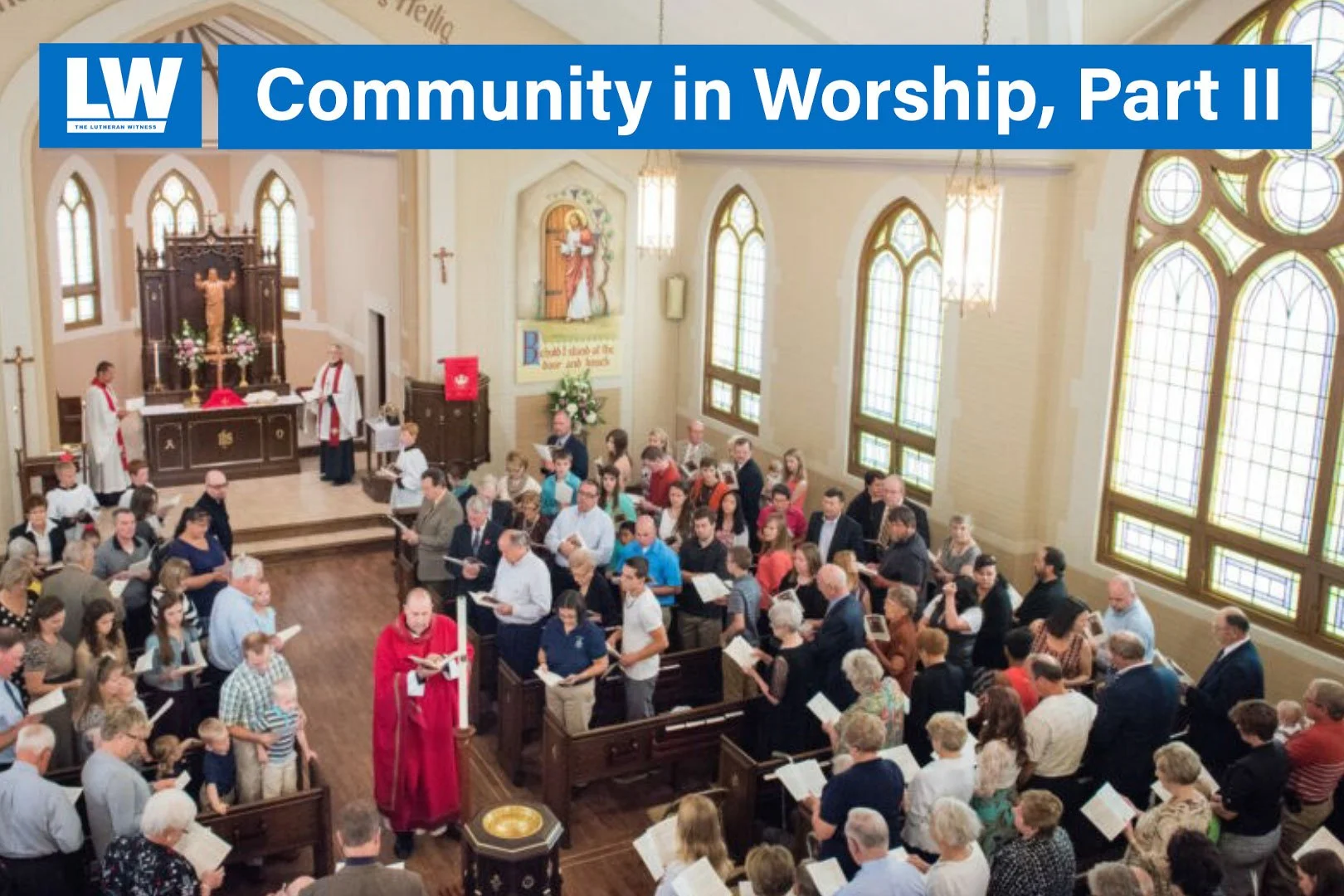Worship Nurtures a Community
Community in Worship, Part II:
That Is Alien to This World
By Phillip Magness
In the first installment of this series, I highlighted the unique character of the Christian community as one created by God. While other communities are based on common human activities, desires, persuasions and identities, the Christian community is based upon — and created by — divine activity. This is seen most clearly when Christians gather for worship, as the Divine Service is a manifestation of the fellowship created for us in Christ Jesus, and a chief venue for the Holy Spirit to perform His work of enlightening and sanctifying us in the Christian faith.
As the Lord has His way with us in worship, a culture alien to this world is formed. In this culture of Christian community, we are nurtured in faith. We grow not only in our own sanctification but are built up with the whole church into the people God intends us to be. Indeed, worship and culture are intrinsically linked. One sees this readily in Romantic languages, where the word for “worship” is a form of the Latin cultus, rather than the Old English worth-ship. In worship, the true and the good are grown — literally cultivated. We are His workmanship (Eph. 2:10), souls in which He works His good and perfect will and accomplishes His purposes (Phil. 1:6).
The Divine Service and all the daily prayer offices (Matins, Vespers, Compline) form us into a unique community. No other community is so tethered to the Lord of heaven and earth. The peace we receive from God through the proclamation of the Gospel for the forgiveness of sins passes all human understanding, as it is an alien peace (Phil. 4:7). It is an extraordinary peace from Jesus Himself, bestowed upon us by the Holy Spirit (John 14:23).
We receive this peace with the whole Christian church on earth as the Spirit sanctifies us and keeps us with Jesus Christ in the one true faith (Luther’s Small Catechism, Third Article). In this
way, worship manifests a community that is in the world, but not of it (John 17:16–27). We are not of the world because we have received an alien righteousness — that is, a righteousness
not of our doing, but of God’s. Possessing an alien righteousness, we form a community that is alien to this world.
In this alien community, we are not static. We are nurtured in faith as we grow in righteousness. The activities of Christian worship grow our faith and strengthen the bonds we share as the Body of Christ. As this happens, our ways and patterns of worship take on a richness all their own. Just as a man-made community develops art, music, sculpture and ceremonies that enrich and magnify the community’s activities, so does the culture of the church.
As the church, we enjoy the fruits of holy culture as our participation in the Means of Grace entails actually doing things. While we passively receive an alien righteousness, we are active participants in the Lord’s work. Our mouths sing, proclaim and confess. We eat and drink the Lord’s Supper, which requires movement and vessels. Our sanctuaries are adorned with liturgical art that evokes Scripture and reinforces the Gospel message. Candles are lit, and pastors move as the action of the liturgy takes us from font to lectern to pulpit to altar.
Many congregations reinforce our reception of this alien righteousness by processing a cross, reminding worshipers than salvation comes to us extra nos, from “outside ourselves.” The ways in which all this is done vary according to the local context but are all rooted in the common ways in which Christian culture has been formed since ancient times: the proclamation of the Word, the preaching of the Gospel, and the administration of the Sacraments. The rich and varied ways in which we participate in these tasks nurture a holy culture among us as we look forward to the ultimate cultus at the throne of the Lamb (Rev. 22:3).
The habits of being in Christian culture allow for the Word to dwell in us richly (Eph. 5:18; Col. 3:16; Heb. 10:25) and keep us growing in our faith. Yet, precisely because this is such a blessing, it also carries a risk. While the way in which a congregation goes about its holy tasks can rightly be cherished as they bring us Gospel gifts, traditions can also become idols for us. Indeed, the medieval church’s elevation of traditions was a chief reason the church needed the Reformation! So it is important — vitally important — that we always keep such things in perspective.
It is good, right and natural to love special hymns, a certain architecture, the way your pastor conducts the service, or the way in which the Lord’s song is led in your congregation. You are being nurtured in the culture of the church through these wonderful things. But we must always fix our hearts on the gifts they deliver; for as important as it is to have a packaging that reflects what is inside, the real seed that is sown in us through the culture of the church is the Gospel. May we always cherish the culture of the church — and of our own congregations within that church — but may we do so only for the sake of what God does for us in that alien culture through His Word and Spirit.

